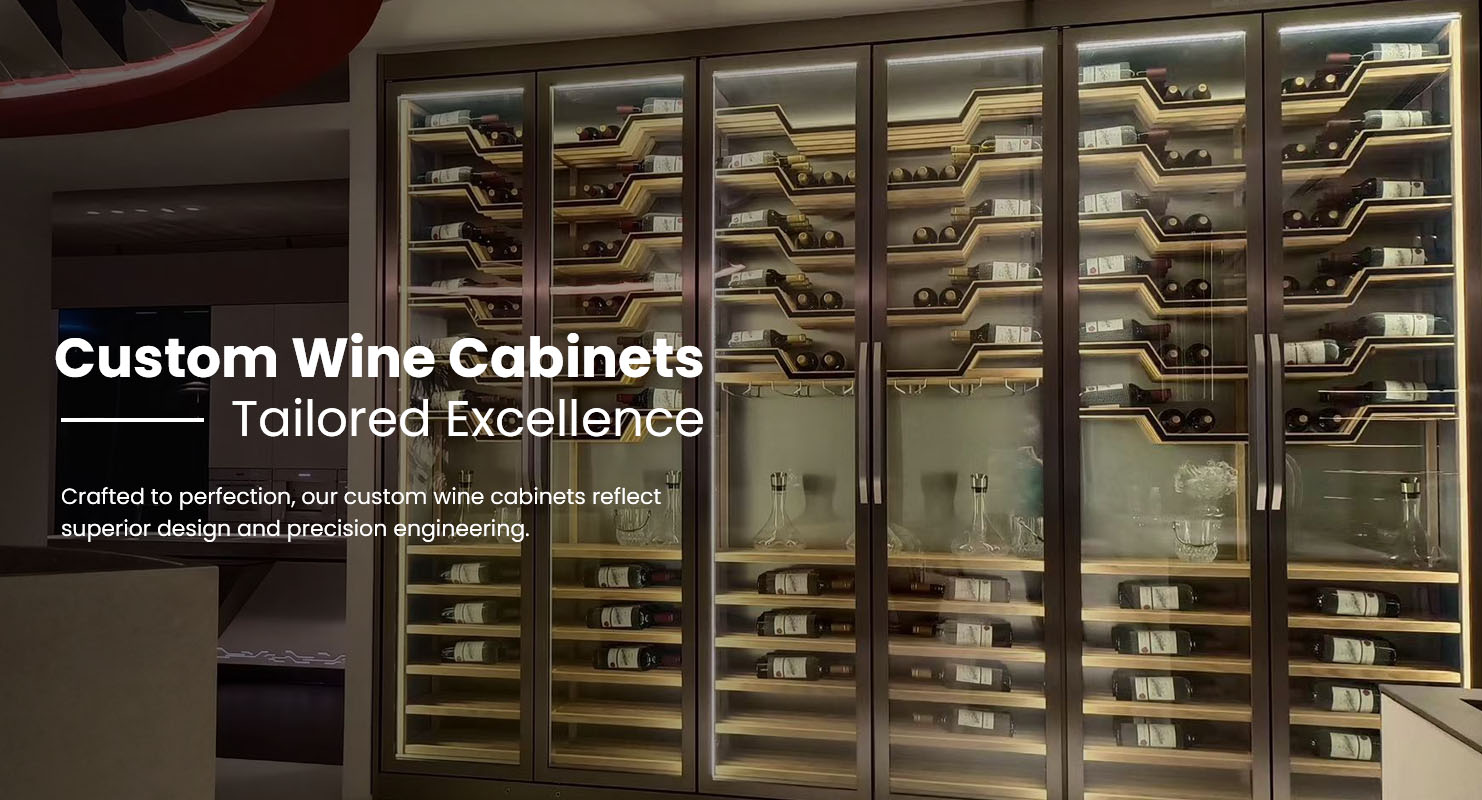Why Does My Wine Cooler Make Noise
A Wine Cooler is designed to run quietly — far quieter than a regular refrigerator.
However, even the best units make some level of sound when operating.
Humming, clicking, or gentle fan noise is completely normal. But if your wine cooler begins to make unusual or louder sounds, it may signal something that needs attention.
Understanding why your wine cooler makes noise helps ensure it continues performing smoothly while keeping your wine collection perfectly preserved.
1. Normal Operating Sounds
Every wine cooler produces light noise during regular operation.
Knowing which sounds are normal can save you from unnecessary concern.
Soft Humming
The compressor cycles on and off to maintain the correct temperature.
A steady hum (similar to a quiet refrigerator) indicates the compressor is working properly.
Airflow Noise
WINTON wine coolers use precision fans to circulate air evenly across all shelves.
You may hear a gentle whooshing sound when the fan is running — this ensures temperature consistency throughout the unit.
Clicking or Popping
When the compressor starts or stops, internal parts expand or contract slightly due to temperature change.
These quick clicks or pops are perfectly normal and harmless.
WINTON coolers are equipped with vibration-dampening compressors and insulated interiors, ensuring these normal sounds remain soft and unobtrusive.
2. When the Noise Is Louder Than Usual
If you notice new or louder noises, it may indicate a small issue with setup or environment.
1. Uneven Placement
If the wine cooler is not perfectly level, the compressor or fan may vibrate against internal panels or the floor.
Solution:
Use a level to check that all four feet are stable.
Adjust height screws until the unit sits evenly on the ground.
2. Bottles Touching Each Other or the Back Wall
When bottles are placed too tightly, they can rattle slightly as the fan circulates air.
Solution:
Leave at least 1–2 cm (½ inch) between bottles.
Avoid letting any bottle rest directly against the cooler’s inner wall.
3. Loose Shelves or Internal Panels
Frequent rearranging of racks can loosen shelf guides, causing mild rattling.
Solution:
Check each shelf for proper fit.
Remove and reinstall until all locking tabs click into place.
4. High Fan Speed During Cooling Cycle
When the interior warms after the door has been opened for a long time, the fan and compressor run harder to restore the set temperature.
The noise level may rise temporarily but will return to normal once the temperature stabilizes.
3. Possible Technical Causes
If the noise persists even after basic adjustments, there may be a minor mechanical cause inside the unit.
1. Vibrating Compressor Mounts
Over time, compressor mounting screws or rubber pads may loosen slightly.
Solution:
Check the back of the unit to ensure all screws and pads are secure.
Tighten gently, avoiding over-torqueing.
WINTON uses anti-vibration rubber mounts to minimize resonance, but regular inspection ensures continued silence.
2. Dust in the Ventilation System
When air vents are dusty, the compressor works harder to release heat — sometimes producing a low hum or buzzing sound.
Solution:
Unplug the cooler and gently vacuum the rear or bottom vents every 3–6 months.
Keeping ventilation clear ensures optimal cooling with minimal sound.
3. Fan Motor Wear
After several years of operation, a fan motor can accumulate dust or lose lubrication, causing a light squeak or whirring noise.
Solution:
Listen closely to locate whether the sound comes from the fan area.
If it persists, contact WINTON’s support team for a replacement part.
All WINTON wine coolers use quiet fan motors under 42 dB, designed for smooth and durable performance.
4. Environmental Factors That Amplify Noise
Sometimes the cooler isn’t the problem — the surroundings are.
Hard flooring (tile, wood, or concrete) reflects vibration more than carpet.
Enclosed cabinetry can amplify normal operating sounds into an echo.
Nearby objects such as wine glasses or trays may rattle from light vibration.
Solutions:
Place a thin rubber mat or vibration pad under the unit.
Ensure adequate space (at least 5–10 cm / 2–4 inches) around the sides and rear for ventilation.
Keep the interior of cabinets open during cooling to reduce echo resonance.
5. Differentiating Compressor and Thermoelectric Noise
Depending on the model type, noise levels vary slightly.
| Cooling System | Noise Level | Common Sound | Typical Use |
|---|---|---|---|
| Compressor | 38–42 dB | Soft humming or occasional clicks | Large capacity, dual-zone models |
| Thermoelectric | 30–35 dB | Gentle fan airflow | Small capacity, silent environments |
Both are quiet by household standards. WINTON’s compressor coolers use precision-balanced motors and noise-dampening insulation, making them among the quietest in their class.
6. Preventive Maintenance Tips
To keep your wine cooler operating quietly:
✅ Clean condenser and air vents every 3–6 months.
✅ Check door seals regularly for tight closure.
✅ Avoid overloading shelves.
✅ Keep the unit level and well-ventilated.
✅ Defrost periodically to prevent ice buildup that can cause vibration.
Consistent maintenance not only reduces noise but also prolongs compressor life and keeps energy use low.
7. When to Contact Support
If the sound becomes noticeably louder, continuous, or metallic, it could indicate a deeper mechanical issue.
Examples include:
Persistent knocking or grinding noise.
Continuous rattling even when the compressor is off.
Unusual fan squeals after cleaning and adjustment.
In these cases, contact WINTON’s service team for professional diagnosis.
Technicians can check for loose fan blades, motor imbalance, or refrigerant flow irregularities — and perform quick repairs before the issue worsens.
8. Key Takeaways
| Cause | Sound Type | Solution |
|---|---|---|
| Compressor cycling | Steady hum | Normal operation |
| Fan circulation | Soft airflow | Normal operation |
| Uneven placement | Vibrating hum | Level the unit |
| Bottles touching | Rattling | Reposition bottles |
| Loose shelves | Rattle | Reinstall shelves firmly |
| Dusty vents | Buzzing | Clean vents |
| Fan wear | Squeak or whirr | Contact service |
Conclusion
A wine cooler making noise is not always a sign of malfunction — often, it’s a normal part of its temperature control cycle.
However, excessive or new noises can result from placement, airflow restriction, or minor component vibration.
WINTON Wine Cooler designs every model with low-vibration compressors, quiet fan motors, and precision-balanced structures, ensuring that your unit remains one of the quietest and most reliable in its class.
With proper setup, cleaning, and maintenance, your WINTON wine cooler will deliver silent, stable, and professional wine storage performance for years to come.
Discover more about WINTON’s professional-grade cooling systems at www.wintonwinecooler.com — where quiet innovation protects every bottle to perfection.
Previous: Why Dual Zone Wine Cooler


